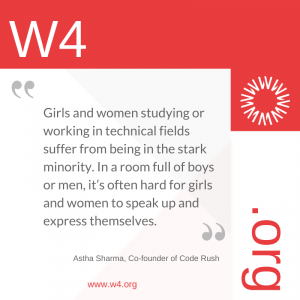Astha Sharma, the young & brilliant Co-Founder of Code Rush in Nepal, speaks with W4 about her drive to promote girls’ and women’s participation in the technology sector in Nepal.
Please tell us about yourself and what inspired you to work with Girls in Technology.
 I’m an electronics and communications engineer living in Kathmandu, Nepal. For the past months, I’ve been a Blockchain researcher, running a blog site, “BlockStuffs”, where I share knowledge on Blockchain technology, plus exciting news and stories from all across the world. I first joined Girls in Technology (GIT) during high school, and I have served as a Core Technical Lead at GIT for the last 4 years.
I’m an electronics and communications engineer living in Kathmandu, Nepal. For the past months, I’ve been a Blockchain researcher, running a blog site, “BlockStuffs”, where I share knowledge on Blockchain technology, plus exciting news and stories from all across the world. I first joined Girls in Technology (GIT) during high school, and I have served as a Core Technical Lead at GIT for the last 4 years.
When I was studying engineering at university, women accounted for less than 10% of students. In Nepal, there is an alarmingly low proportion of girls and women in most technical education fields. That’s the main reason I became involved in GIT, which is an open community that promotes women’s participation in technology.
I recently co-founded “Code Rush”, a software company that trains graduate females and hires them to develop services for clients. We are in the start-up phase and I am currently engaged in building a roadmap for the company.
Since 2015, I’ve been focusing on initiatives to enable girls and women to acquire the skillsets they need to enter and succeed in technology-oriented careers. Through GIT, I’ve sought to create a common platform for women interested in or involved in tech. The main objective is to provide a forum that brings people together—whether it’s students, beginners with limited or no tech experience, or professionals—so they can share their journey, insights, and experiences.

What are the main challenges faced by girls and women in Nepal, in terms of girls’ and women’s empowerment? And in what ways do you think women’s inclusion in the tech sector can help to improve both their lives and society in general?
In Nepal, where the adult literacy rate is around 64.7%, employment tends to follow gender stereotypes. Homemaking is considered most well suited for women, whereas men can generally engage in any profession they wish. This pattern is changing, fortunately, but women often face the hard challenge of reconciling their work and family responsibilities. They struggle to find a work-life balance, and a lot of women in Nepal forgo or give up their careers to take care of their families and homes.
A hard pill to swallow in Nepalese society is that girls and young women are often forced or feel obliged to marry at an early age. If girls do get the chance to study at university, they feel pressured to marry and start a family soon after graduating. In more progressive families and communities, it’s sometimes a little different. But it’s still very much the case for countless girls and women in Nepal. Most female students do not even consider a career in the field of technology; it seems to them such an unlikely possibility.
In general, across Nepal, job segregation persists and women have lower-income jobs. And the ICT sector has always been male-dominated. Even when girls and women do pursue ICT studies and careers, women tend to occupy lower-level positions: they hold only 30% of operational or technical positions, 15% of managerial level positions, and 11% of strategy and planning positions. Thus, girls and women studying or working in technical fields suffer from being in the stark minority. In a room full of boys or men, it’s often hard for girls and women to speak up and express themselves. They also have very few female role models. In this context, girls and women can lose their self-confidence, which can, in turn, hold them back in the STEM field.
Information Technology (IT) increasingly permeates every aspect of society and provides the foundation for most modern innovations. Technology is at the forefront of development in any nation. However, women remain the most underrepresented minority group in the technical field. This lack of diversity is egregious not only for women but for the whole society. Research shows that diversity drives innovation. The persistent lack of women in the IT field results in a lack of ideas, innovation, and valuable knowledge from women’s perspectives. In addition to the negative impact of this on the performance of teams and companies, we’re seeing examples of the dangers of this lack of diversity, the dangers of persistent gender bias, in AI.

Could you tell us a bit more about Girls in Technology: how and why was it created? Please tell us about some of your activities and programs.
I got involved in Girls in Technology with seven other girls who were studying STEM and hoping to pursue STEM-related careers. We wanted to make other girls and women aware of the vast scope of opportunities in technology. Subsequently, 12 other members joined us to create a platform for girls and women everywhere who might be interested in ICT or already engaged in ICT work, in order to encourage them to embrace studies and careers in technical fields. Our goal was to bring together talented women from the tech field, along with newcomers to the field, to foster learning, inspiration, excitement, and wonder—and to provoke conversations that matter.
Clearly, the problem is not girls’ and women’s capabilities. For example, a research report by the American Association of University Women (AAUW), “Why So Few? Women in Science, Technology, Engineering, and Mathematics (STEM)”, demonstrates that girls and women perform remarkably well in STEM subjects. Research also reveals the various benefits of women’s increased participation in STEM careers, ranging from better decision-making in a company to increased innovation. With GIT, our ultimate goal is to see more women in leadership roles in STEM careers, and to that end, we’re starting by encouraging girls early on to pursue studies and careers in technical fields.
 GIT mainly focuses on enabling girls and women to build the skillsets they need to advance in STEM careers. We also conduct networking events to provide opportunities for students/beginners to interact with and learn from professional women who are already working and succeeding in STEM fields. We’ve organized a variety of different activities such as meetups, workshops about fostering women’s entrepreneurship, conferences incorporating professional guest speakers, project demonstrations and pitches, and panel discussions. We recently held a conference that brought together over 150 women: it was inspiring in terms of the diversity of the participants and perspectives. We also hosted a conference focusing on the challenges and opportunities for women in the tech industry in Nepal.
GIT mainly focuses on enabling girls and women to build the skillsets they need to advance in STEM careers. We also conduct networking events to provide opportunities for students/beginners to interact with and learn from professional women who are already working and succeeding in STEM fields. We’ve organized a variety of different activities such as meetups, workshops about fostering women’s entrepreneurship, conferences incorporating professional guest speakers, project demonstrations and pitches, and panel discussions. We recently held a conference that brought together over 150 women: it was inspiring in terms of the diversity of the participants and perspectives. We also hosted a conference focusing on the challenges and opportunities for women in the tech industry in Nepal.
In addition to all this, GIT provides workshops that take the form of intensive training sessions to provide girls and women with in-depth knowledge about programming. We have focused mainly on “Zero to Basics” workshops for girls and women who are new to programming as a way of encouraging their interest in the field and enabling them to take their first steps.

Please tell us about your new company, “Code Rush”. What are your objectives with “Code Rush”, and in what ways does it complement the work done by Girls in Technology?
Currently, here in Nepal, becoming a mother too often precludes you from having a career. There is a heavy burden on women to take care of their families and children. I believe that’s one of the main reasons why there are so few women in leading roles in the tech business in Nepal. At Code Rush, we encourage women to pursue their careers and believe that this should not be at the expense of having a family! Men should help to support the family and take care of the children, too. Moreover, we’re convinced that if you allow a woman to thrive and to lead, she will be capable of taking care of her family and extended family while also succeeding in her work.
Right now, women in Nepal have limited career choices. The great thing about the IT field is that it often allows for working at a distance, from home, if there’s a good internet connection. This flexibility could be a solution for women, enabling them to better reconcile their work and family responsibilities and avoid the harsh trade-off between career and family.
How would you like to see Girls in Technology and Code Rush develop? What is your vision for the future?
According to research at Stanford University, 40% of male graduates with STEM degrees go on to work in STEM-related jobs, but only 26% of female STEM graduates do so. Code Rush supports trainees and provides them with job placement opportunities (internship/ job opportunities) after they complete their training. Our long-term goal is to build a pipeline of ICT-skilled women professionals who will be the tech leaders of tomorrow.
With both Girls in Technology and Code Rush, we are spotlighting girls’ and women’s accomplishments and potential in technical fields, in order to raise awareness about and thereby break limiting stereotypes. We are promoting a growth-mindset and helping to build an enabling environment and ecosystem for girls and women who wish to pursue ICT studies and careers. Of course, in carrying out my work as a woman professional working in a tech company, I’m trying to serve as a role model, too—and I hope I might inspire other girls and women to realize their potential in tech.

How can individuals support your work?
We are always keen to collaborate, and there are many ways to support our work. We’re looking for individuals with tech skills to share their knowledge and experience as mentors and/or trainers. We’re also seeking non-technical support, individuals who can help us grow our community by publicizing our work and activities.
Would you like to add anything?
Let’s work together to foster the tech leaders and innovators of tomorrow: “In the future, there will be no female leaders. There will just be leaders.”- Sheryl Sandberg, Lean In: Women, Work, and the Will to Lead














